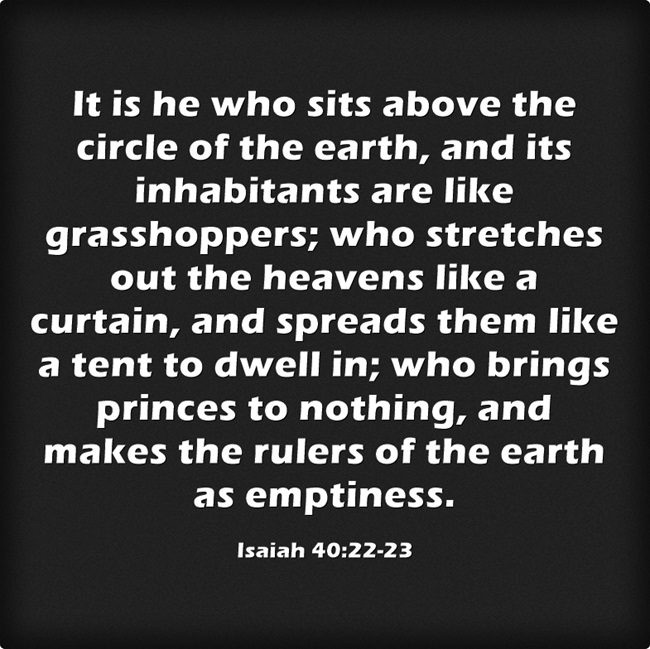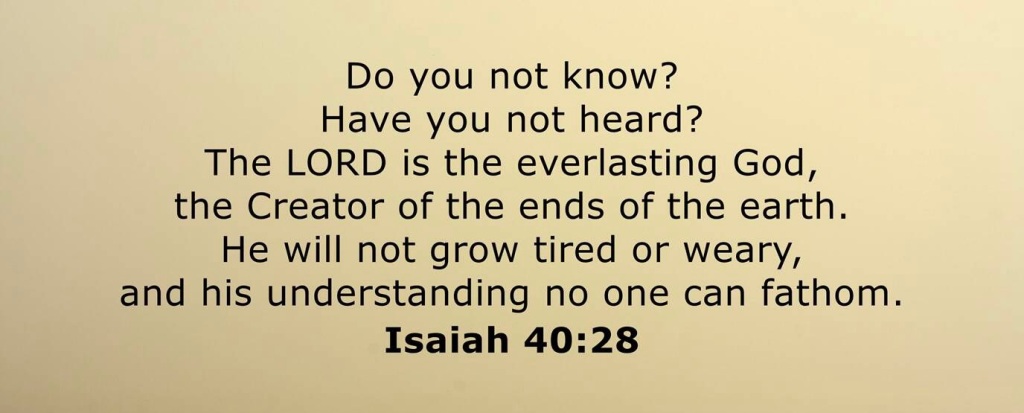The passage proposed for this coming Sunday, the Fifth Sunday after Epiohany (Isa 40:21–31) is from a section of the book of Isaiah which is very well known. It reaches it climax with the well-known acclamation that “those who wait for the Lord shall renew their strength, they shall mount up with wings like eagles, they shall run and not be weary, they shall walk and not faint” (Isa 40:31).

Words earlier in this oracle tell of the voice which cries out “in the wilderness prepare the way of the Lord” (Isa 40:3). We know these words as they are applied directly to John the baptiser early in the Gospels (Mark 1:2–4 and parallels; John 1:19–23). In that context, these words of the prophet invite us to look forward, in anticipation to the story of Jesus, which will follow.
These words, however, have a different reference in their original context. The words of the exilic prophet whose work forms the second section of Isaiah (chs. 40—55) are oriented towards the appearance of God to the people of Israel as they wait and hope for the end of their exile in Babylon. The prophet says that God will comfort the people (v.1), speaking tenderly to Jerusalem, declaring that “her penalty is paid” (v.2)—and then, that “the glory of the Lord shall be revealed, and all people shall see it together” (v.5).
The promise of God is clear; the prophet states that God declares, “I will send to Babylon and break down all the bars, and the shouting of the Chaldeans will be turned to lamentation” (43:14; 48:14; and see the extended oracle of 47:1–15). He specifically nominates Cyrus of Persia as the one chosen (or anointed) by God to bring the exiles home (Isa 44:28—45:1; 45:13). We know from 2 Chron 36:22–23, and the books of Ezra and Nehemiah, that this did indeed take place.
The prophet describes the way out of exile and back to the land once promised, ages before, to the ancestors of Israel, in terms which evoke the miraculous liberation from slavery in Egypt—at least in terms of the story that is told in Exodus. Whilst evidence to support the Exodus narrative as “historical” is strikingly missing, the story developed in the Exodus narrative is powerful.
So as the prophet describes the journey leaving Babylon and returning to Jerusalem he evokes that narrative escape from Egypt, indicating that the Lord God “will open rivers on the bare heights, and fountains in the midst of the valleys … [he] will make the wilderness a pool of water, and the dry land springs of water” (41:17–20; see also 43:16–17; 49:9–10; 50:2).
Because it was the Lord who “dried up the sea, the waters of the great deep [and] made the depths of the sea a way for the redeemed to cross over” (cf. Exod 14:19–22, 30–31), the prophet declares exultantly, “the ransomed of the Lord shall return, and come to Zion with singing” (Isa 51:10–11). In order to facilitate this return, in the opening oracle of this section, the prophet declares that “every valley shall be lifted up, and every mountain and hill be made low; the uneven ground shall become level, and the rough places a plain” (40:4).

The particular part of this opening oracle that the lectionary offers for this Sunday (Isa 40:21–31) is a song of praise to God, for the power that “the everlasting God, the Creator of the ends of the earth” exercises in the world. In the foundational saga of Israel, “Everlasting God” is the name given to the Lord by Abraham at Beersheba (Gen 21:33).
In contrast to the eternally-enduring deity, whose word will “stand forever” (40:8), the prophet observes that humans are like grass; “the grass withers, the flower fades”, he twice states (40:7, 8). In this, the prophet echoes other passages where the same observation is made. One psalmist laments that “my days are like an evening shadow; I wither away like grass” (Ps 102:11), in contrast to the Lord, who is “enthroned forever; your name endures to all generations” (Ps 102:12).
Job, similarly, bemoans the reality that “a mortal, born of woman, few of days and full of trouble, comes up like a flower and withers, flees like a shadow and does not last” (Job 14:1–2). This fleeting character is linked with evildoers in another psalm; they “will soon fade like the grass, and wither like the green herb” (Ps 37:2).

Yet another psalm includes a prayer that the wicked will “vanish like water that runs away; like grass let them be trodden down and wither; let them be like the snail that dissolves into slime; like the untimely birth that never sees the sun” (Ps 58:7–8). The prophet Jeremiah links the withering of grass to the wickedness of those in the land (Jer 12:1–4), while the prophet Isaiah had noted that the withering of the whole world was a curse that signalled the impending judgement on the world (Isa 24; see v.4).
In the context of this understanding of God, the eternal one, and human beings, whose lives are fleeting, the prophet has announced good tidings (40:9), that the Lord God “comes with might, and his arm rules for him; his reward is with him, and his recompense before him” (40:10). God will not leave people bereft. God comes to “feed his flock like a shepherd … gather the lambs in his arms, and carry them in his bosom, and gently lead the mother sheep” (40:11). The eternal God is a caring, compassionate being.
Alongside this comforting image of the deity, the prophet shares a vision of the God who “sits above the circle of the earth … stretches out the heavens like a curtain, and spreads them like a tent to live in” (40:22). God is described as residing “above” in narrative texts (Josh 2:11; 1 Ki 8:23; 2 Ki 19:15) and prophets (Isa 37:16; Ezek 10:19; 11:22). Job recognises “God above” (Job 3:4; 31:2, 28); psalmists praise “God above the heavens” (Ps 57:5, 11; 108:5).
God above is not remote; God above descends to intervene—as the prophet says, the Lord God “brings princes to naught, and makes the rulers of the earth as nothing” (Isa 40:23). This resonates with the words that Hannah sings, that the Lord “kills and brings to life; he brings down to Sheol and raises up … [he] makes poor and makes rich; he brings low, he also exalts; he raises up the poor from the dust; he lifts the needy from the ash heap, to make them sit with princes and inherit a seat of honour” (1 Sam 2:6–8).
This also correlates with words of the psalmist, singing that when the hungry “are diminished and brought low through oppression, trouble, and sorrow, he pours contempt on princes and makes them wander in trackless wastes; but he raises up the needy out of distress, and makes their families like flocks” (Ps 107:39–41), and that “the Lord upholds all who are falling, and raises up all who are bowed down” (Ps 145:14). Similar thoughts, of course, are also,expressed in the pregnant Mary’s song of praise (Luke 1:51–53).

Extolling this God as above all and eternal means that the existence of other entities with a claim to divinity need to be explained. “To whom then will you compare me, or who is my equal?”, the prophet enquires (40:25). Only the Lord God is creator (40:26, 28). Surely, in the mind of the prophet, this places this God in a distinct and unique place.
So it is within these oracles of promise and hope that the theological understanding of monotheism is clearly articulated for the first time in the history of Israel. “Is there any god besides me? There is no other rock; I know not one” (44:8). The phrase, “there is no other (god)”, recurs a number of times in this section (42:8; 45:5, 14, 21, 22; 46:9). This echoes the refrain in Deuteronomy, that “the Lord is God; there is no other besides him” (Deut 4:35, 39; 5:7; 6:14; 7:4; 8:19; 11:16, 28; 13:6–7, 13; 17:3; 18:20; 28:14, 36, 64; 29:26; 30:17–20). Deuteronomy in the form that we know it is to be dated to the exile or return—the same time as the unnamed prophet in Second Isaiah is active.
This claim that the Lord God is the only god is in contrast to the way that the God of Israel had previously been portrayed, as “among the gods” (Exod 15:11; Judg 2:12; Ps 86:8), with the commandment to have “no other gods before me” (Exod 20:3; Deut 5:7) distinguishing this God from those other gods whom Israel was clearly forbidden to worship (Deut 6:14; 7:4; 8:19; 11:16; 13:1–18; 17:2–5; 18:20).
Before the Exile, the possibility of other gods had been entertained. After the experience of exile, the singularity of the Lord God becomes a central claim. And this, in turn, leads into the monotheistic strand that shapes the movement that Jesus initiated.
The prophet concludes this particular oracle with words of inspiration (40:28–31). Two rhetorical questions set the scene: “Have you not known? Have you not heard?” (40:28a). A foundational theological affirmation in the prophet’s worldview follows: “The Lord is the everlasting God, the Creator of the ends of the earth” (40:28b).
Elsewhere in Hebrew Scripture, we find statements that God “looks to the ends of the earth and sees everything under the heavens” (Job 28:24), that God’s name “reaches to the ends of the earth” (Ps 48:10), that God is “the hope of all the ends of the earth and of the farthest seas” (Ps 65:5), and that “all the ends of the earth have seen the victory of our God” (Ps 98:3).
Prophets also affirm that “from the ends of the earth we hear songs of praise, of glory to the Righteous One” (Isa 24:16), that “all the ends of the earth shall see the salvation of our God” (Isa 52:10), and that to the Lord “shall the nations come from the ends of the earth and say: Can mortals make for themselves gods? Such are no gods!” (Jer 16:19).

And so the rhetoric of the prophet rises up into a grand poetic affirmation about this world-encompassing God, who “does not faint or grow weary” (40:28c), as the prophet repeats the earlier affirmation (40:23) that God “gives power to the faint, and strengthens the powerless” (40:29). This picks up the earlier affirmation that God “brings princes to naught and makes the rulers of the earth as nothing” (40:23), folded into the declaration that this same God “gives power to the faint and strengthens the powerless” (40:29).
Springboarding off the imagery of fainting/strengthening, the prophet then contrasts “youths [who] will faint and be weary and young [who] will fall exhausted” (40:30) with “those who wait for the Lord [who] shall renew their strength” (40:31a). This imagery, which closes the oracle, is used to portray this renewal of strength—that of an eagle rising up into the sky. It has caught the imagination of people of faith over many centuries. The rising eagle depicts the way that believers “shall run and not be weary, they shall walk and not faint” (40:31b).

The eagle is known in Christian symbolism as the symbol of the evangelist John, because of the “high Christology” his Gospel contains, reflecting the divinity of Jesus in traditional interpretation. The four symbols (man, lion, ox, and eagle) are in turn derived from the striking vision that opens the book of Ezekiel, who saw “fire flashing forth continually, and in the middle of the fire, something like gleaming amber; in the middle of it was something like four living creatures … the four had the face of a human being, the face of a lion on the right side, the face of an ox on the left side, and the face of an eagle” (Ezek 1:4–10).
“The way of an eagle in the sky” is included amongst the “three things too wonderful for me” that the sage ponders (Prov 30:18–19), while the prophet Obadiah warns Moab, “though you soar aloft like the eagle, though your nest is set among the stars, from there I will bring you down, says the Lord” (Obad 1:4).
The power of the eagle, soaring high into the sky and spreading wide its wings, features in oracles by Jeremiah (Jer 48:40; 49:22) and Ezekiel (Ezek 17:3), and is used to describe how the Lord God guided “his people Jacob”: “as an eagle stirs up its nest and hovers over its young; as it spreads its wings, takes them up, and bears them aloft on its pinions, the Lord alone guided him” (Deut 32:11–12). It’s a powerful and inspiring image to conclude this opening oracle of the prophet as he looks for the exile of his people to end.

See also https://johntsquires.com/2022/08/31/comfort-and-hope-return-from-exile-isaiah-40-55/

